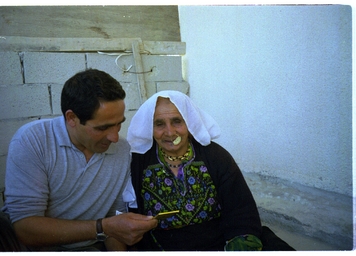
Hajji Umm Ibrahim al-Sanaa with Hassan, Lakiya, Nagab Photo: R.Sayigh
|
 Hajji Umm Ibrahim al-Sanaa with Hassan, Lakiya, Nagab Photo: R.Sayigh |
| Hajji Umm Ibrahim al-Sanaa, Lakiya, March 28, 2000:
|
|
Hassan takes me to meet his mother, Umm Ibrahim, who lives inside Lakiya's official boundary. She lives alone in a small house across a wadi filled with olive trees, but close by her stands the larger house of her oldest son, Ibrahim. Ibrahim's wife and daughter are preparing food in the bright sunlight of the courtyard. They invite us to join them for a coffee. We don't stay long. Afterwards I ask Hassan why we had stopped? Is it because they would have been offended if we hadn't? He reflects, then says apologetically that he can't answer, doesn't know. This makes me think how driven and constrained I am -- like most Northerners -- by the habit of planning time, of having a specific goal which sets one against diversions; and how an anthropologist needs to shift into a different mode where social relational values predominate over 'productivity'.
Umm Ibrahim is also working when we arrive, preparing lunch, though confined to her chair by knees swollen by rheumatism. She says that bedouin women deride any woman who stays in bed if she isn't sick. I find her dialect as hard to understand as she finds mine. I'm grateful that Hassan stays with us to help drive the recording along. Umm Ibrahim is older than Hajji Mariam, she already had four of five children when they were expelled from Lakiya, gives a detailed description of their expulsion to Tell Arad, adds, "They treated us like ping-pong balls". She wears a delicate filigree ornament in her nose, oddly modern today with body-piercing back in fashion. Her opening remarks focus on women's daily work, and the preparation of food. Present and past seem to be fused here, for though she uses the present |
tense, she talks of cooking for a large family, and a time when Hassan's grandfather "would kill ten cows for a meal" -- obviously for an important family occasion.
Hajji Umm Ibrahim begins speaking: After we leave Umm Ibrahim, as we walk home, Hassan tells me anecdotes about his mother. The one I can't forget is how, when he was a boy of ten or so, he fell during a game of football and scraped the side of his head. His mother cleaned the wound in bedouin fashion, by rubbing dust on it. A few months later he felt pain where the wound had been. His mother inspected the site, took a knife and cut his skin, and extracted a worm. This must have been some 35 to 40 years ago; of course there was no doctor or clinic or pharmacy in Lakiya then, but neither was there any family First Aid shelf with iodine or alcohol. |
| 1.Translation not found yet. It could be a kind of pot, or food |
[Hajji Mariam al-Sanaa] [Alayan al-Sanaa] Copyright©2005 |
|